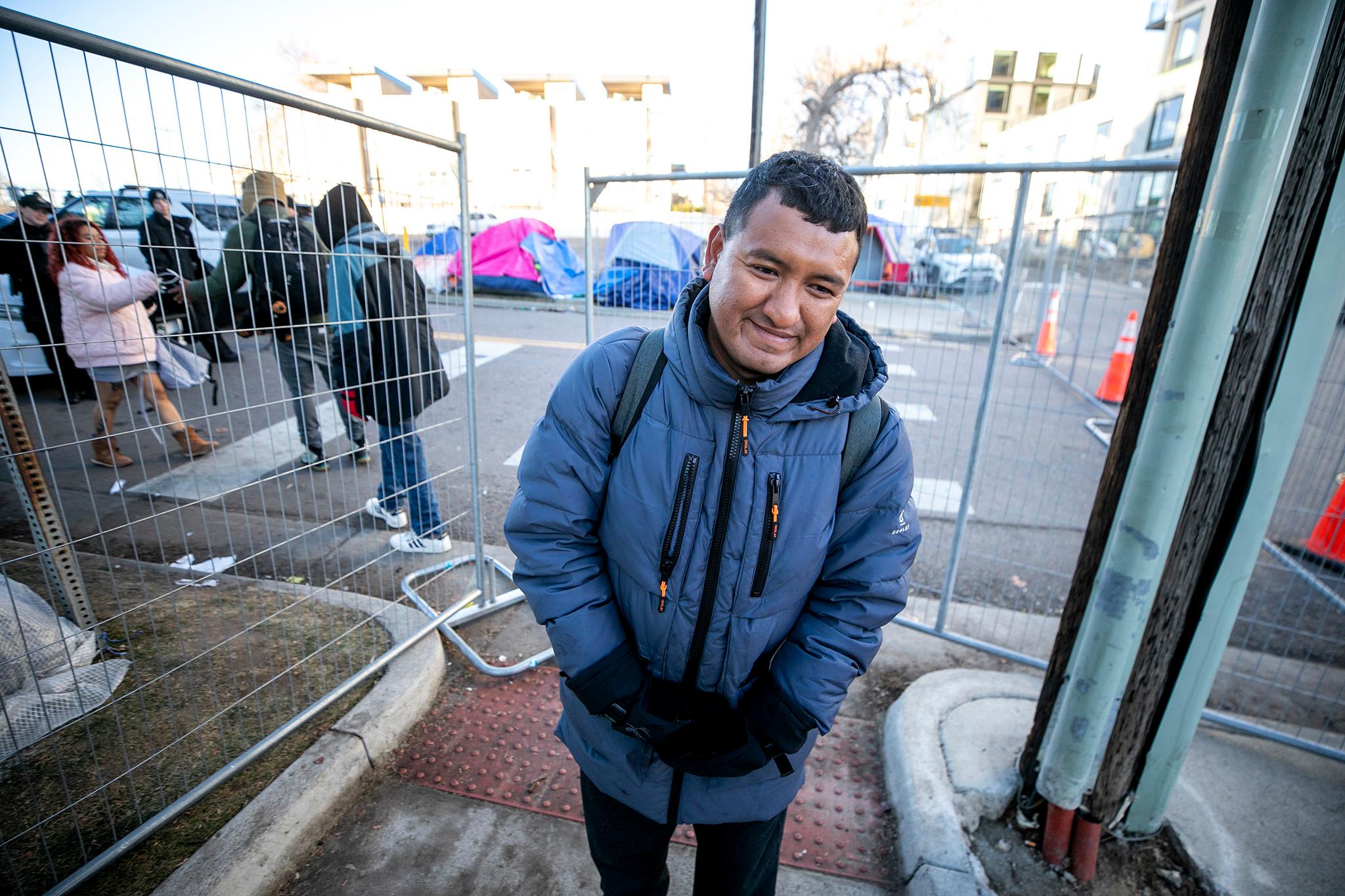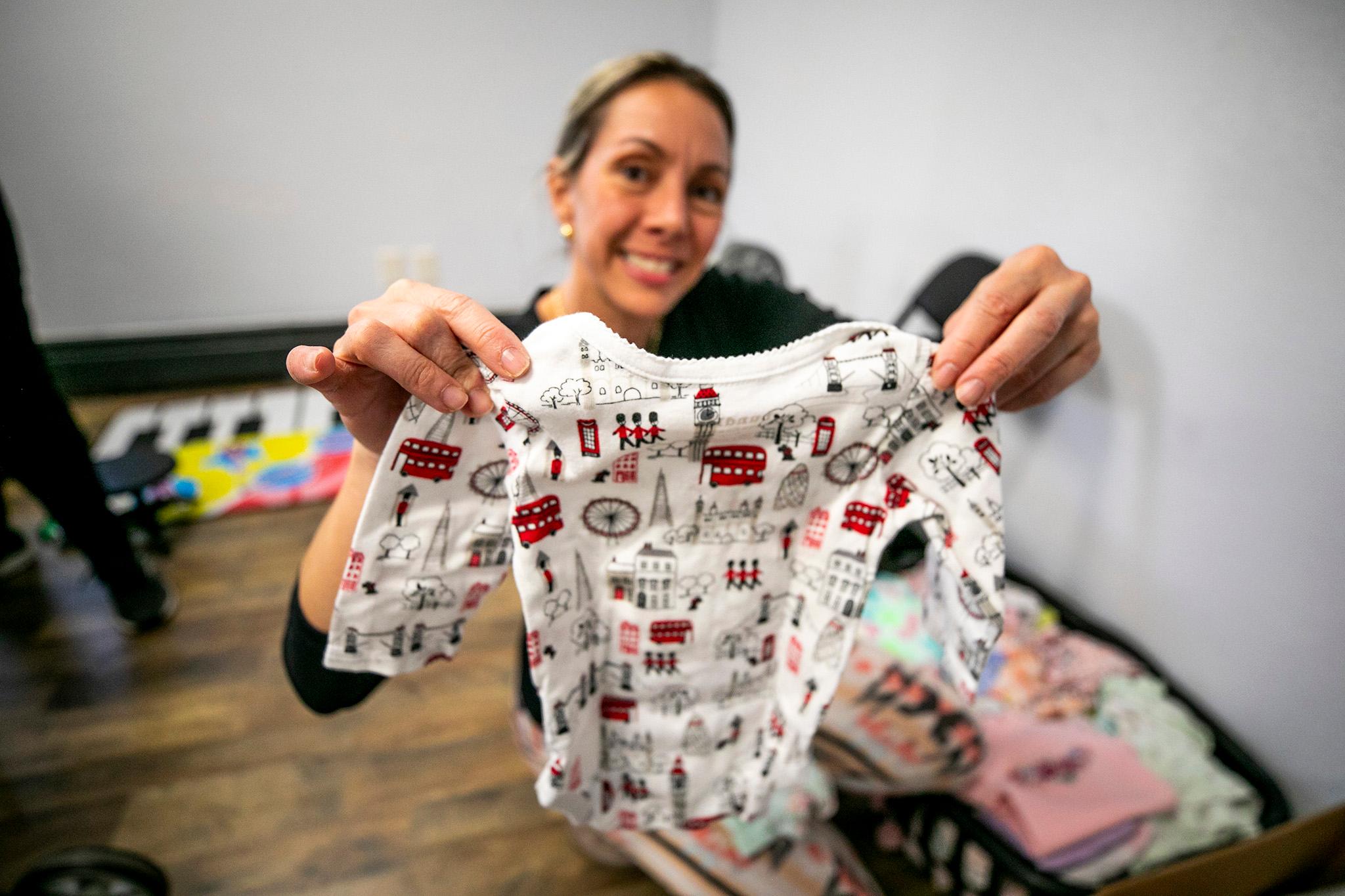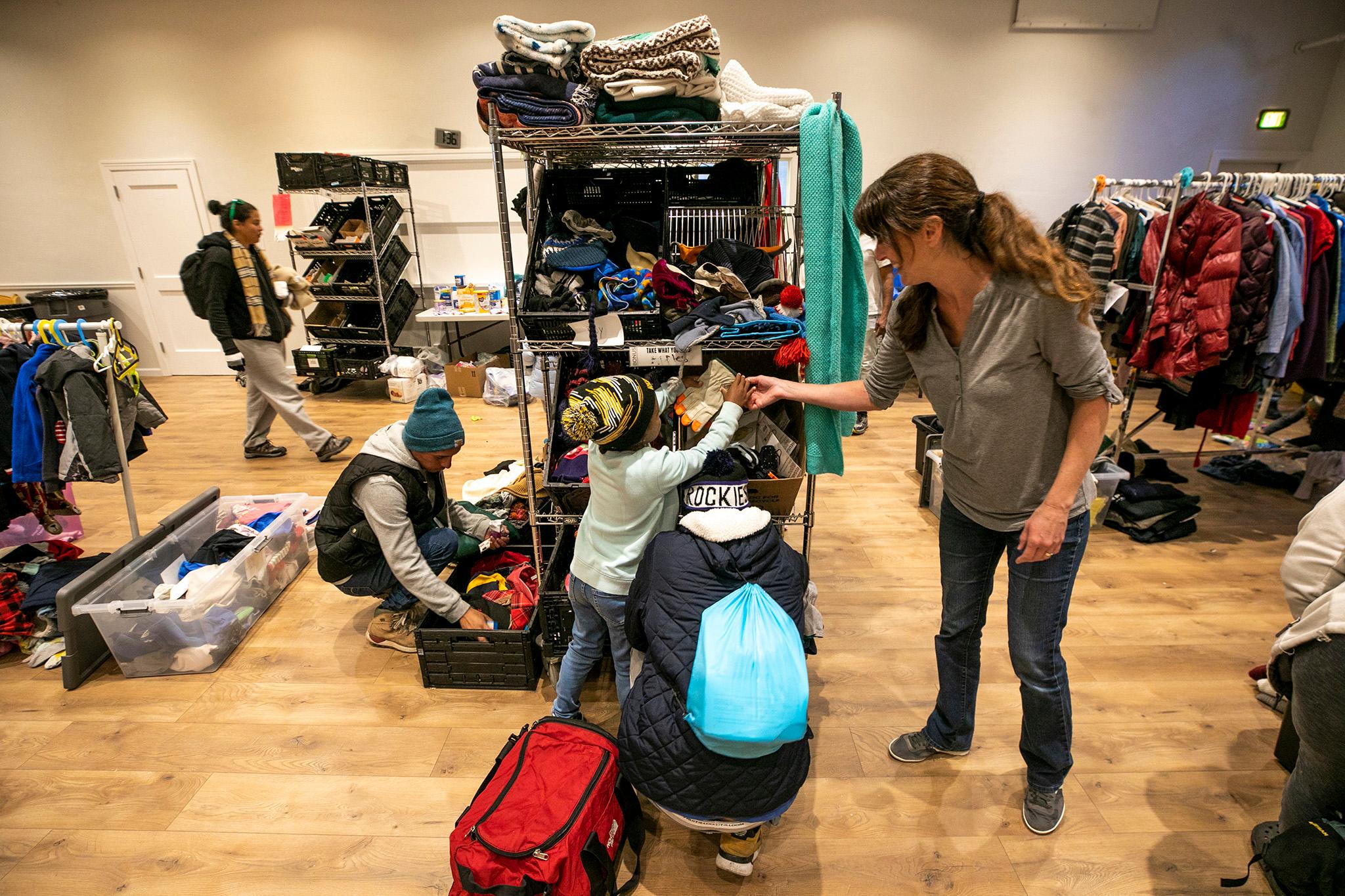Updated Feb. 6, 2024
Denverites have been asking: What do the thousands of Venezuelan migrants who have moved here over the past year need? And how can we help?
In dozens of conversations with new immigrants over the past year, Denverite has heard people express the same messages again and again: We don't want handouts. We want to work. And we want a home.
The city has invested more than $38 million in temporarily sheltering new immigrants, currently nearly 4,600 people. And Mayor Mike Johnston is working with the mayors of Chicago and New York to push the federal government to expedite work permits and provide more funding for cities' response efforts, so people can start to build a life here and not depend on government support.
Even so, some new immigrants, including families with children, have been living in encampments around the city. Others are staying in motels and hotels. And some are living in government buildings. Denver residents are concerned, and they're finding ways to help, from housing and employing people to hosting clothing drives, cooking meals and more.
Denverite spoke to community groups, the city and neighborhood organizations on the front lines of the crisis to find out how everyday residents can get involved in the response.
Here's how the city says you can help.
"One of the best ways your average person can support the effort is by donating to the Newcomer's Fund, which to date has already provided more than $1.6 million in funding toward housing, fees associated with applying for work authorization and more," said Jon Ewing, a spokesperson for the Department of Human Services.
The Newcomers Fund, administered by the Rose Community Foundation, offers grants to nonprofits on the frontlines of the migrant crisis.
Who gets the money? A steering committee with representatives from city and state government, the Denver Foundation, the Latino Community Foundation of Colorado, and Mile High United Way decide.
Mayor Johnston himself is asking residents to "hire people and help them get to work," he told Denverite. He also wants more people to volunteer to help get people access to housing and to rent out units to new immigrants.
"We have folks who are willing to work hard and were able to pay the rent," he said. "They need access to apartments."
Employing immigrants
It's important to know that many immigrants arriving here are not yet authorized to work legally in the U.S., meaning they will be unable to apply for open jobs because they can't provide a valid Social Security number and proof of work authorization.
That being said, it's a fact of life that, for decades, immigrants in the U.S. have been working for pay under the table.
Denverites are hiring new immigrants without work authorization for small gigs, like house cleaning and landscaping, Spanish lessons, hair and nails, clowning, childcare, art projects and crafting. New immigrants we spoke to said they planned to save money to pay for housing and work authorization (which can cost almost $500).
The laws around work authorization have put Denver in a bind, Johnston has repeatedly said. Instead of allowing people to work for a living, the federal government is forcing municipalities to fund social services for migrants, burdening taxpayers and undermining migrants' hope to build a life here independently, he has argued.

Many residents view hiring people, despite the legal restrictions, to be a way to support both a city that has spent $36 million assisting more than 37,000 migrants while they are not permitted to work and to support people trying to move into this country.
Several migrants we spoke to told Denverite they were eager for more snow to come because they could go out and shovel driveways and sidewalks.
One man made money hanging up a basketball hoop for a woman.
Advocates are asking community members to consider hiring migrants first and to pay at least market rates for work.
Some community members are helping immigrants find clients. To do so effectively, advocates ask people to ensure migrants are receiving fair pay and are collecting wages.
Groups like Centro de los Trabajadores are working to help migrants navigate work and offering other resources. Chamba is an app connecting migrants with people looking to hire, too.
Entire neighborhood Facebook groups include requests from migrants looking for employment and requests from people looking for workers. Many of those are happening in neighborhood-based mutual aid groups.
Useful housing information to share with migrants
In Colorado, the Immigrant Tenant Protection Act, passed in 2020, prohibits landlords from forcing tenants to disclose their immigration status or using it against them, according to the Colorado Poverty Law Project, a tenants legal defense organization that has a primer on the policy.
Since immigration is a protected class in Colorado, advocates are pushing landlords and even people with spare rooms with locks to rent out to migrants, or even to share units.
The Colorado Hosting Asylum Network connects resident households with asylum seekers. Other host families are connecting with migrants in person or through social media sites.
Various nonprofits and government agencies have limited rental assistance programs for people who qualify. Those programs pay first and last month rent plus deposits. A full list of such organizations is available by calling 211 or by going to the 211 website.
The city itself has helped fund rental assistance for some new immigrants being forced to move from Zuni Street.
Neighbors across the metro have rallied to support immigrants in multiple ways.
Some have hosted clothing drives. Others have collected sleeping bags, rolling suitcases, tents and tarps for migrants who are sleeping on the streets. Volunteers have cooked lunches for people living at the shelter. Those who need a service have been hiring people for good-paying jobs and inviting families into their homes.
The City of Denver has identified some items new immigrants need and places to drop them off.
Neighbors have been asking migrants in need to post requests for support on social media, mostly in Facebook groups. Page admins have been vetting participants in the groups and weeding out any opportunists who arrive to exploit newcomers.
Families hosting and assisting migrants with work authorization, legal resources, medical appointments and more have reached out to neighbors when they need more resources.

"Visit our Facebook page," said Rachel Handler of the Central Park and Park Hill Venezuelan Migrant Support Group. "Check out our meal train, sign up for a meal, get a group together that can help you donate money. If that's all that you have or all the time that you can put in, go onto our Amazon wishlist. We have things from $2 for a single stick of deodorant up to strollers for $80 bucks, so you can order something there. And all price ranges."
Here's a growing list of Facebook groups where people are organizing support efforts. Many of these include documents about the best ways to support their efforts:
I-70 and Pecos Venezuelan Migrant Support Group
Central Park and Park Hill Venezuelan Migrant Support Group
Southwest Denver Migrant Support Group
South Denver and Migrant Support Group
Broomfield-Boulder Community Outreach
Highlands Moms and Neighbors Venezuelan Migrant Support
Sometimes the best way to help is to connect immigrants you meet to the resources that already exist. Here are some of those.
211
The 211 hotline and website are one-stop shops for migrants and those wanting to help and looking for resources. The phone line, at 211, is available Mondays through Fridays from 8 a.m. to 5 p.m.
The organization has Spanish-speaking social service navigators on the phone who can provide free translation. There are also free transportation services, resources for English as a Second Language classes, legal resources, food banks, shelters, household goods, hygiene products, rent payment programs, physical and mental services, business services and much more.
Denver Public Library
For people looking for information -- any and all information -- the libraries are a great resource. They even publish the New American Resource Guide which includes information about housing, healthcare, taxes, employment, case management and more.
Department of Motor Vehicles
Do you know a migrant looking to get a driver's license and figure out the rules around that? Here's the DMV's guide for migrants in English. Go to the top right-hand corner of the screen and select the appropriate language for a translation.
Denver Health Refugee Clinic
Denver Health offers a variety of services for migrants in its refugee clinic. In additional to health screenings, the organization educates families on how to navigate the healthcare system. For more information, go here.
Denver Legal Night
On the first and third Wednesdays of the month, from 5:30-8 p.m., lawyers gather at the Centro San Juan Diego, at 2830 Lawrence St. Attorneys, including some who speak Spanish, specialize in immigration, family, criminal, landlord/tenant, consumer and employment law. For more information, go here. Fair warning: These can be packed, so show up early. The event is volunteer-run, and there are opportunities for getting involved.
Denver Public Schools
The Denver Public Schools Foundation has set up the Newcomer Student and Family Fund to take donations to help support schools and other programming that supports refugees, migrants and social services for families.
"The needs of the migrant and refugee population are vast, with many being met in a number of different ways throughout Denver," said Sara Hazel, Vice President of Development & Impact of DPS Foundation, in a statement. "What makes this fund special is that we'll be able to make a direct impact for the newcomer students and their families by allocating resources directly to schools and programs within DPS to welcome these students and families with resources that they need immediately."
Those resources include supporting enrolment; multilingual education programming and transportation; the development of a toolkit for new arrivals; and welcome meetings for new students and their families.
Office of Immigrant and Refugee Affairs and Agency for Human Rights
The city's Office of Immigrant and Refugee Affairs and Agency for Human Rights and Community Partnerships put together this guide about city services available to people regardless of documentation status. Here it is in English, and here it is in Spanish.
There are ways to get involved that are not so helpful.
According to multiple participants in the neighborhood migrant-support Facebook groups, some well-intentioned people (and many not-so-well-intentioned people) are offering to hire immigrants but are paying below minimum wage -- a practice that has caused a lot of debate and ired many in the community.
"All that they want is to work, to be treated well," said Handler.
Meanwhile, the city is pushing people to reconsider when and where they donate.
"We absolutely love all of the people who have stepped up and continue to step up in support of others," said Ewing, the Department of Human Services spokesperson. "However, it can prove very difficult for everyone involved when people in shelter or otherwise are accumulating more belongings than can be reasonably stored or that can even create a fire hazard. It's a balance for sure. What I'd like to see a little more of is that amount of support with items and others come in after someone is already housed."
Denverite reporter Isaac Vargas contributed reporting to this article.
Editor's note: This article will be updated as the immigrant arrival situation in Denver develops.
This article was updated on Feb. 6, 2024, to reflect our style change moving away from the term "migrants" in our coverage. Read more here.













